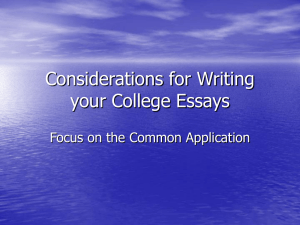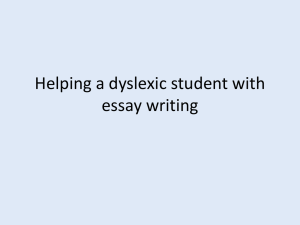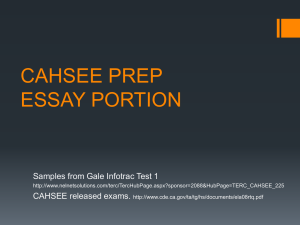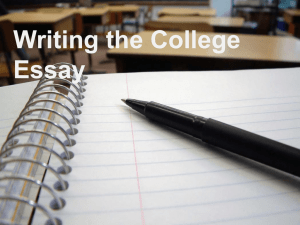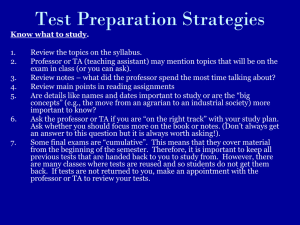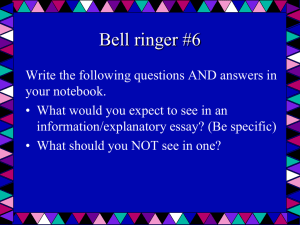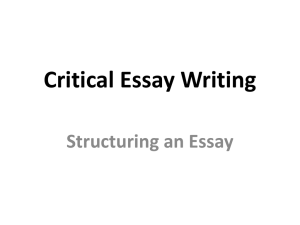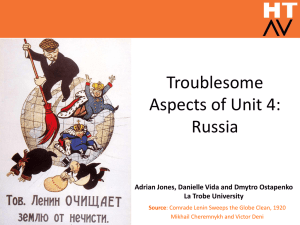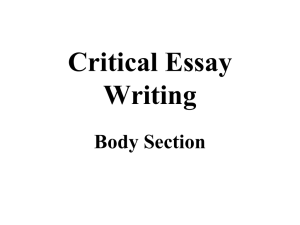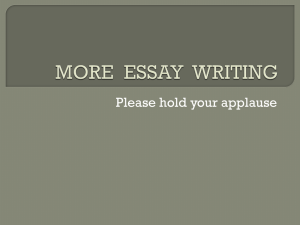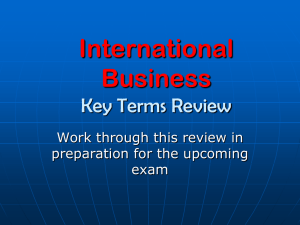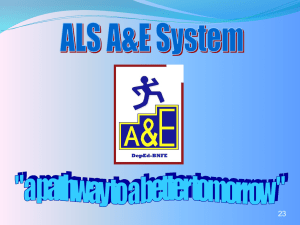College Essay Presentation by Mrs. Kelsey of WHS
advertisement
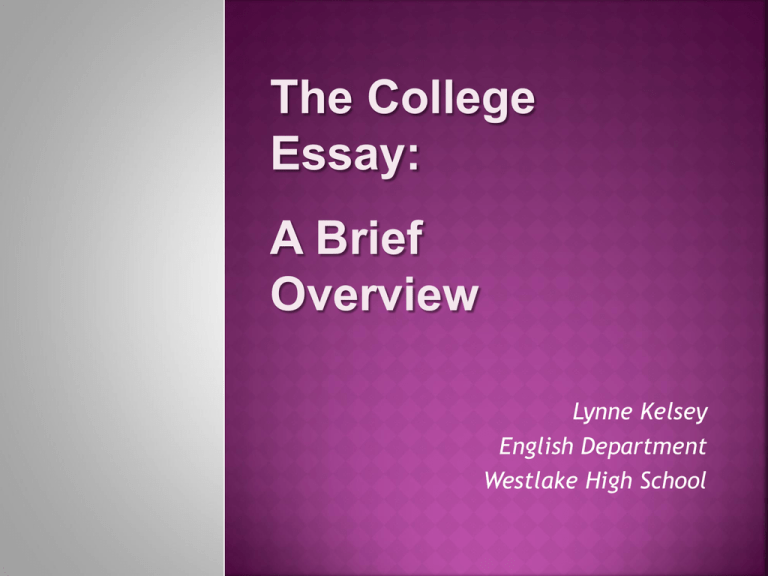
The College Essay: A Brief Overview Lynne Kelsey English Department Westlake High School The Process “How to write a college essay” is a topic that can’t be summed up in 30 minutes. However, the advice that would apply to any serious school assignment also applies: Start early Focus your writing on the question being asked, not the question you would like to answer Revision is more than just correcting spelling mistakes; it is “to see again” That being said, let’s discuss the Top Ten Things to remember when approaching your essay. #1—Do You Need One? The University of California requires a Personal Statement as part of the application. The California State University does not; nor do California Community Colleges. Schools that use the Common Application, such as Pepperdine and CLU, require a Personal Essay. Students have a choice of prompts. Whether or not your school requires an essay, your senior English teacher probably will! #2—Write About YOU Though the prompt may ask something like, "Indicate a person who has had a significant influence on you, and describe that influence," don't fall into the trap of simply writing a profile of your grandfather. Focus on his impact or influence on you - that's what admission counselors want to read about! #3—Avoid the Cliché Essay The Big Game, the Mountaintop Epiphany, or the Community Service Insight are valid and significant events for many students, but they can become cliché. Use caution and concentrate on vivid examples. Okay: "I want to help people. I have gotten so much out of life through the love and guidance of my family, I feel that many individuals have not been as fortunate; therefore, I would like to expand the lives of others." Better: "My Mom and Dad stood on plenty of sidelines 'til their shoes filled with water or their fingers turned white or somebody's golden retriever signed his name on their coats in mud. I think that kind of commitment is what I'd like to bring to working with fourth-graders." #4—Show, Don’t Tell Develop your main idea with vivid and specific facts, events, quotations, examples, and reasons. There's a big difference between simply stating a point of view and letting an idea unfold in the details: Okay: "I like to be surrounded by people with a variety of backgrounds and interests" Better: "During that night, I sang the theme song from Casablanca with a baseball coach who thinks he's Bogie, discussed Marxism with a little old lady, and heard more than I ever wanted to know about some woman's gall bladder operation." #5—Yes, They Count! Even though this is a personal essay, it is a formal piece of writing. Spelling, grammar, capitalization—they all count. In addition to learning about you, colleges use the application essay as a way to learn about your writing ability— an important consideration not matter what your intended major. #6—Clean Up Your Act! In a survey of over 400 college admissions officers, at least 10% said they routinely check students’ social networking pages. The impression was not always favorable. Immediately take down any suggestive photos; unsubscribe to any groups that promote illegal (or even questionable) activity. Make sure your profile picture is appropriate. Similarly, register for an email that follows a simple format like your first and last names, with numbers as needed. Do not apply to college using “soccerhottie” or “so_stoned” #7—Know Your Deadlines The application window for the University of California opens in mid-October; submissions are made from November 1-30. Your Personal Statement should be finished—revised, proofread, and polished—well before that. Do all of your writing and editing in a word processing program; you just want to be able to cut and paste it into the application. Closing dates for other universities vary; however, early decision deadlines will be as early as mid-November. #8—If it Helps, Consult a Book There are dozens of books available about writing the college essay. They tend to fall into two categories: Workbooks that take the student through a series of writing exercises Collections of exemplary essays that usually include a brief analysis of what makes each example successful #9—Explore the Internet Likewise, there are dozens of websites that discuss writing the college essay, including: www.collegeboard.com http://thechoice.blogs.nytimes.com http://collegeapps.about.com/ http://www.collegeview.com/articles/CV/applic ation/the_essay.html http://owl.english.purdue.edu/owl/resource/64 2/01/ #10—Put in the Time Competition at selective schools is getting harder every year. Writing a college essay is not a “once and done” effort. There’s no getting around it—writing a good essay is WORK! Even if you plan to go to a school that does not require an essay in their application, putting in the time to do a good job will give you an idea of the level of writing that will be required of you in college. GEORGE ORWELL’S RULES FOR EFFECTIVE WRITING Never use a metaphor, simile, or other figure of speech which you are used to seeing in print. Never use a long word where a short one will do. If it is possible to cut a word out, always cut it out. Never use the passive where you can use the active. Never use a foreign phrase, a scientific word, or a jargon word if you can think of an everyday English equivalent. Break any of these rules sooner than saying something outright barbarous. Aiming for Door #1! While an essay alone won’t get you into the school of your dreams, an exemplary essay may make the difference between you and a similarly-qualified candidate. Do your best work! This presentation and additional handouts will be available on the Westlake High School website under COUNSELORS: http://www.conejo.k12.ca. us/whs/Counseling.aspx
